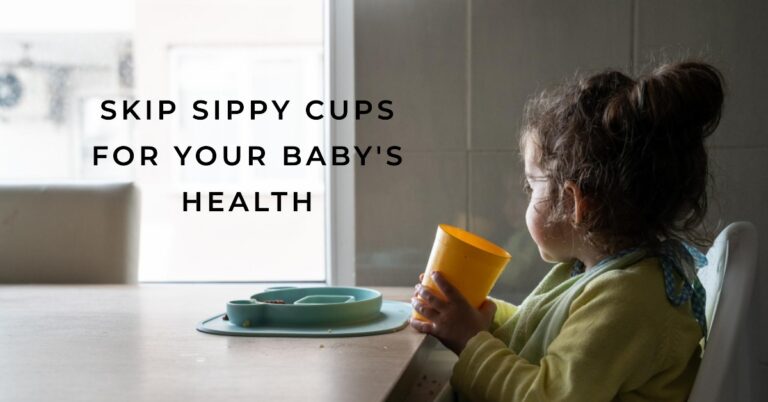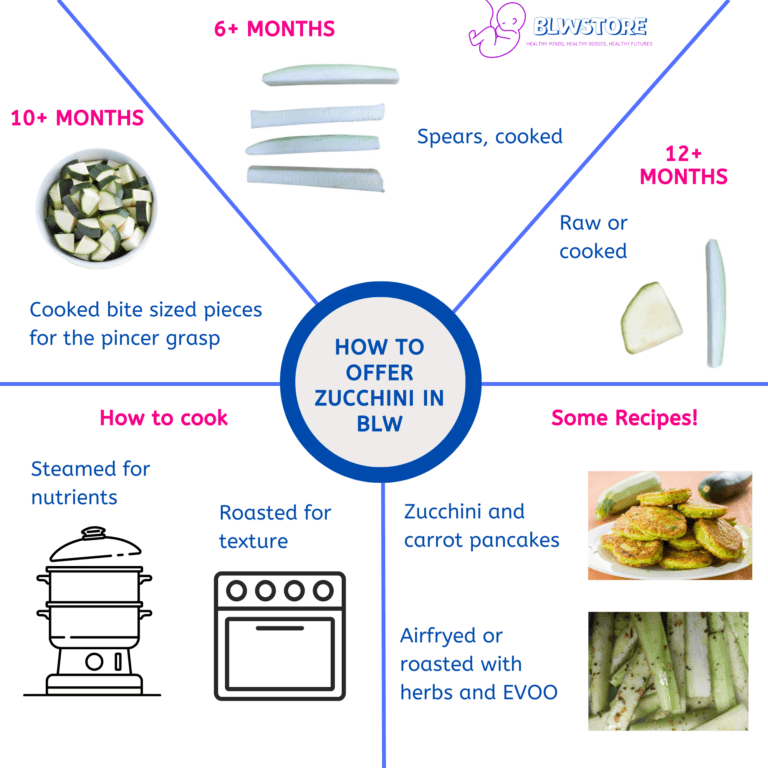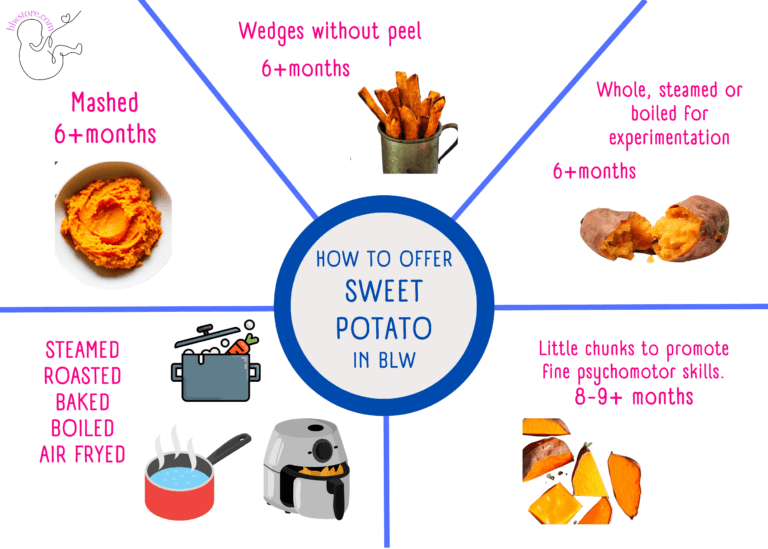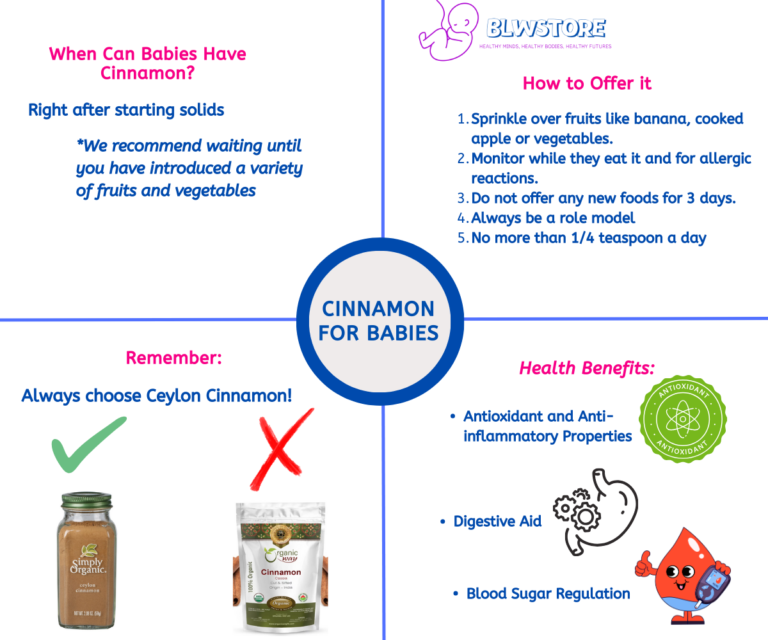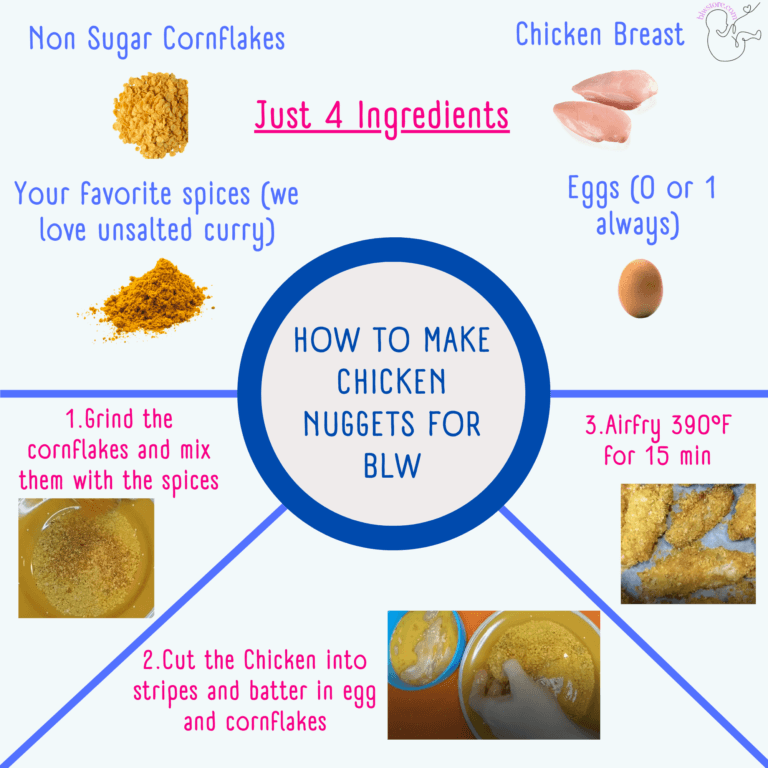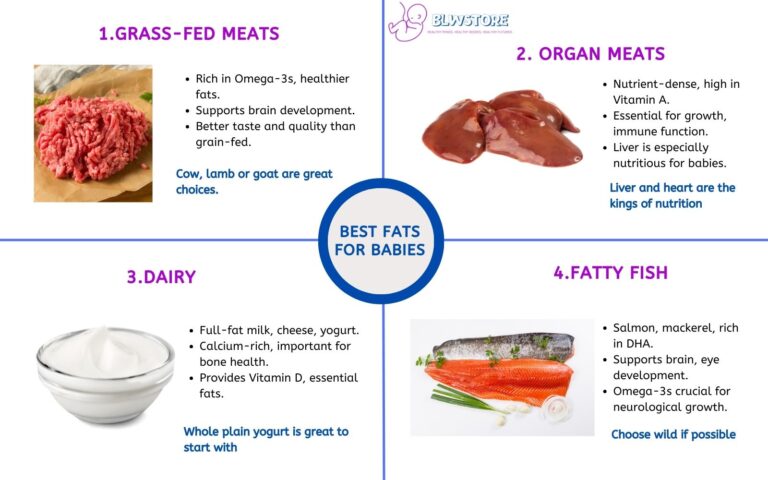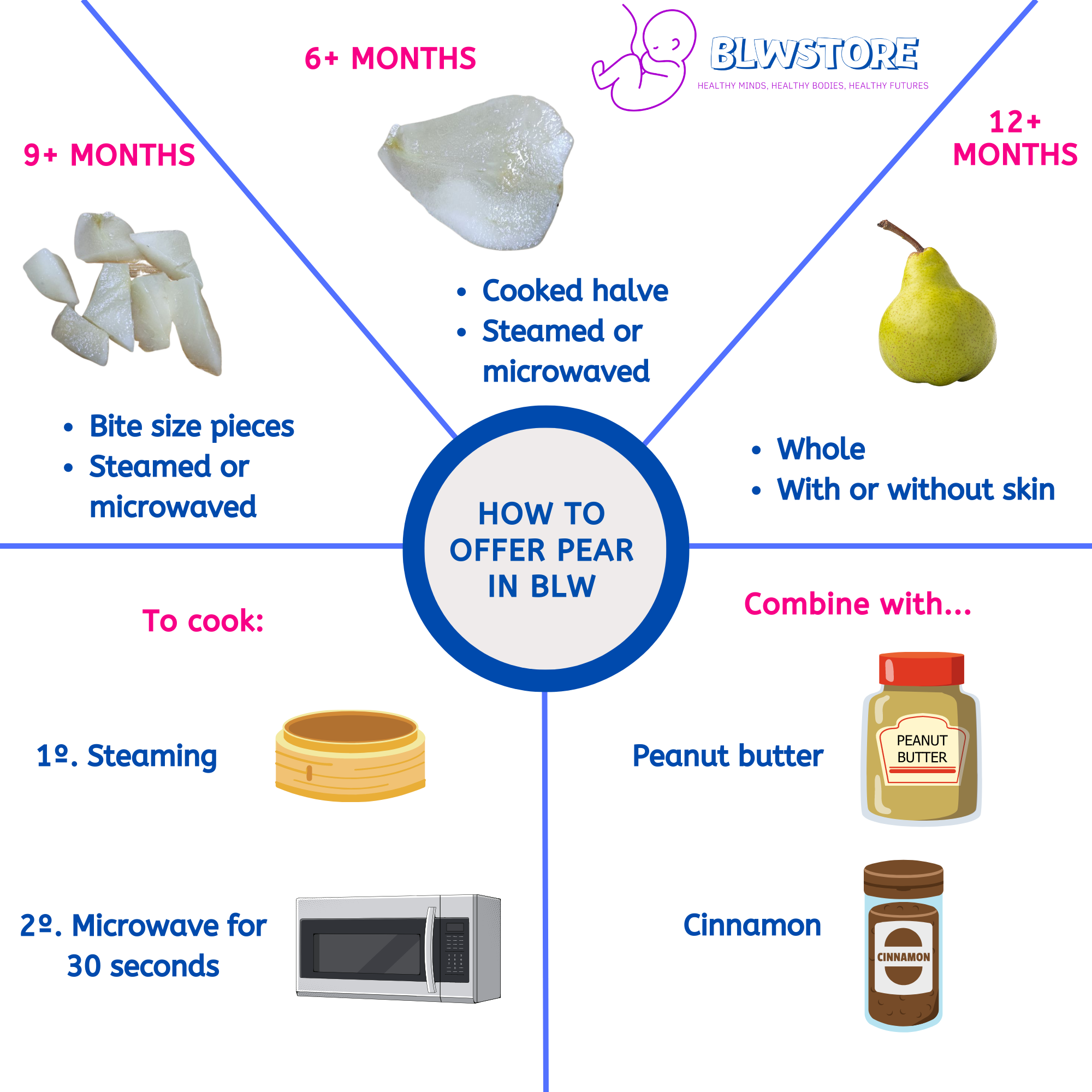
Pears are excellent for introducing your little one to new flavors and textures.
Not only are they delicious, but they are also packed with essential nutrients that can benefit your baby’s health.
In this article, we will guide you through the process of introducing pears to your baby through baby-led weaning.
We will cover everything from when to introduce pears to your baby, how to serve them, and even provide some tasty pear recipes for you to try at home.
Let’s get after it!
Key Takeaways
- Introduce pears to your baby at around 6 months, ensuring they are soft and ripe or cooked.
- Pears are a nutritious fruit, rich in fiber, vitamins C and K, and potassium, among other nutrients.
- Different pear varieties offer varying nutritional profiles, but all are beneficial for your baby.
- Serve pears according to your baby’s age and development, from cooked halves to bite-sized pieces.
- Pears are a choking hazard due to their firm and slippery texture; always serve soft, ripe, or cooked pears.
- Allergies to pears are uncommon but monitor for reactions when introducing them to your baby’s diet.
- Pears are generally well-tolerated and not a common cause of gas or digestive issues for babies.
- Explore various pear recipes for BLW, such as cinnamon pear puree, pear and avocado smash, and pear and peanut butter bites.
- Store pears properly to maintain their freshness, from raw whole pears to cooked leftovers.
- Organic pears may be worth considering, especially to reduce exposure to pesticides.
- Offer whole, mashed, or pureed pears instead of pear juice to provide the most nutritional benefits.
- Cooking pears is advised for younger infants, while older babies can handle ripe, tender raw pears.
When can you introduce Pears to your baby?
Babies can start having pears when they are around 6 months old.
However, it’s important to make sure that the fruit is very soft and ripe or cooked until soft to avoid the risk of choking.
What are the benefits of pears for babies?
Pears are a nutritious fruit that has many benefits. They have a high fiber content, making them a great addition to your baby’s microbiome. Also, they have vitamins C and K, essential for the immune system and blood coagulation.
| Nutrient | Amount per 100g |
|---|---|
| Calories | 57 |
| Protein | 0.4g |
| Fat | 0.1g |
| Carbohydrates | 15.3g |
| Fiber | 3.1g |
| Vitamin C | 4mg |
| Vitamin K | 4mcg |
| Potassium | 119mg |
| Calcium | 9mg |
| Iron | 0.2mg |
What is the most nutritive kind of pear?
All pear kinds are nutritious and offer a range of vitamins and minerals. Nonetheless, the nutritional profiles of various pear types vary slightly.
The Bartlett pear is one of the most popular and combines critical elements, such as vitamin C, fiber, and potassium.
On the other hand, Bosc pears have a slightly higher content of vitamins and minerals, such as copper and vitamin K.
The most nutritive kind of pear is the one your baby enjoys the most and is available in your area.
How to serve pear to baby
6 to 9 months
You may serve it in cooked halves (soft enough to be pierced) or mashed.
Pear skin has lots of fiber, but it can be difficult for babies to manage. In our experience with Pablo, we did not offer pear with skin until he was 12 months old.
But every baby is different, so we recommend trying it and deciding from there.
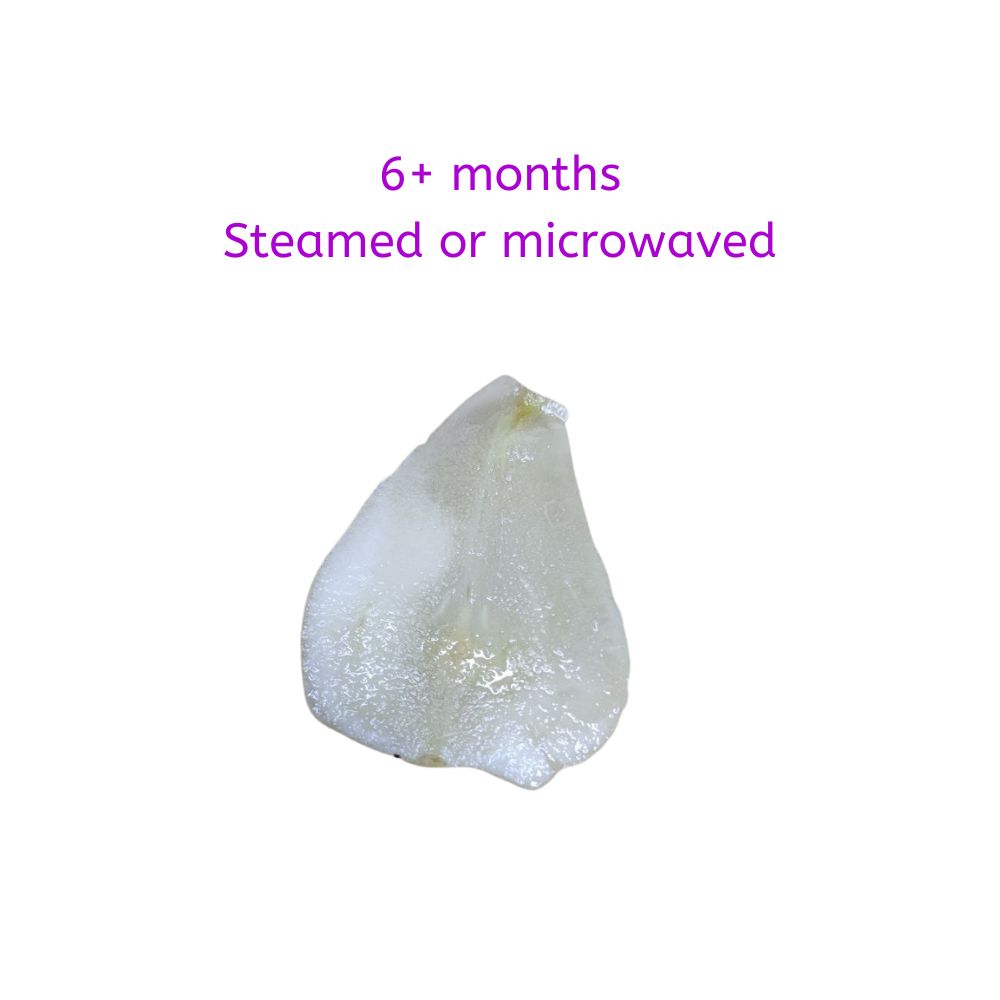
9 to 12 months
At this point, your baby will probably be able to do the pincer grasp, and we should be promoting the development of fine motor skills.
It is because of this that offering pear in bite-sized pieces is best.
You should also steam or microwave it or choose a pear that is ripe enough for your baby to manage.
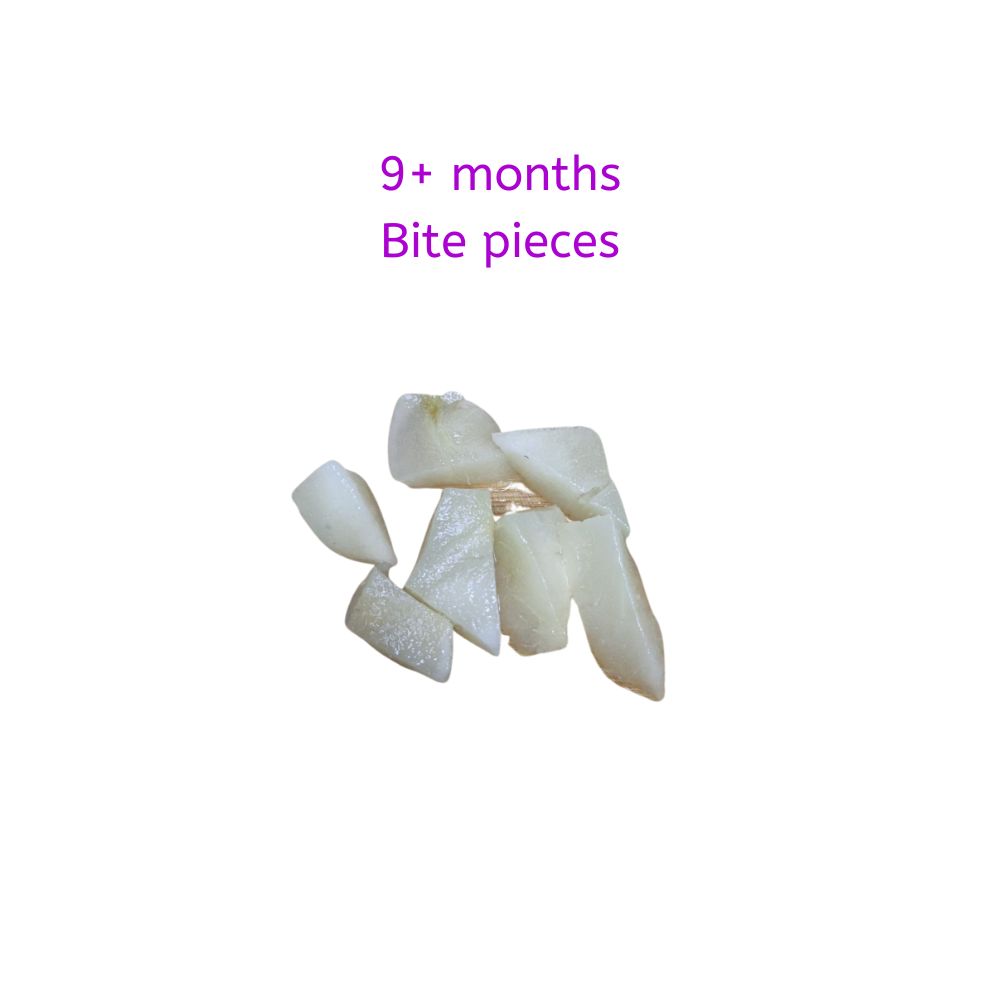
12+ months
At 12 months, and if you have done BLW since the six-month mark, your baby will be ready to manage the whole pear with or without skin.
Also, at this point, you can start being creative and mixing different fruits with different flavors and textures and using spices or nut butter to improve tastes and nutrients further.
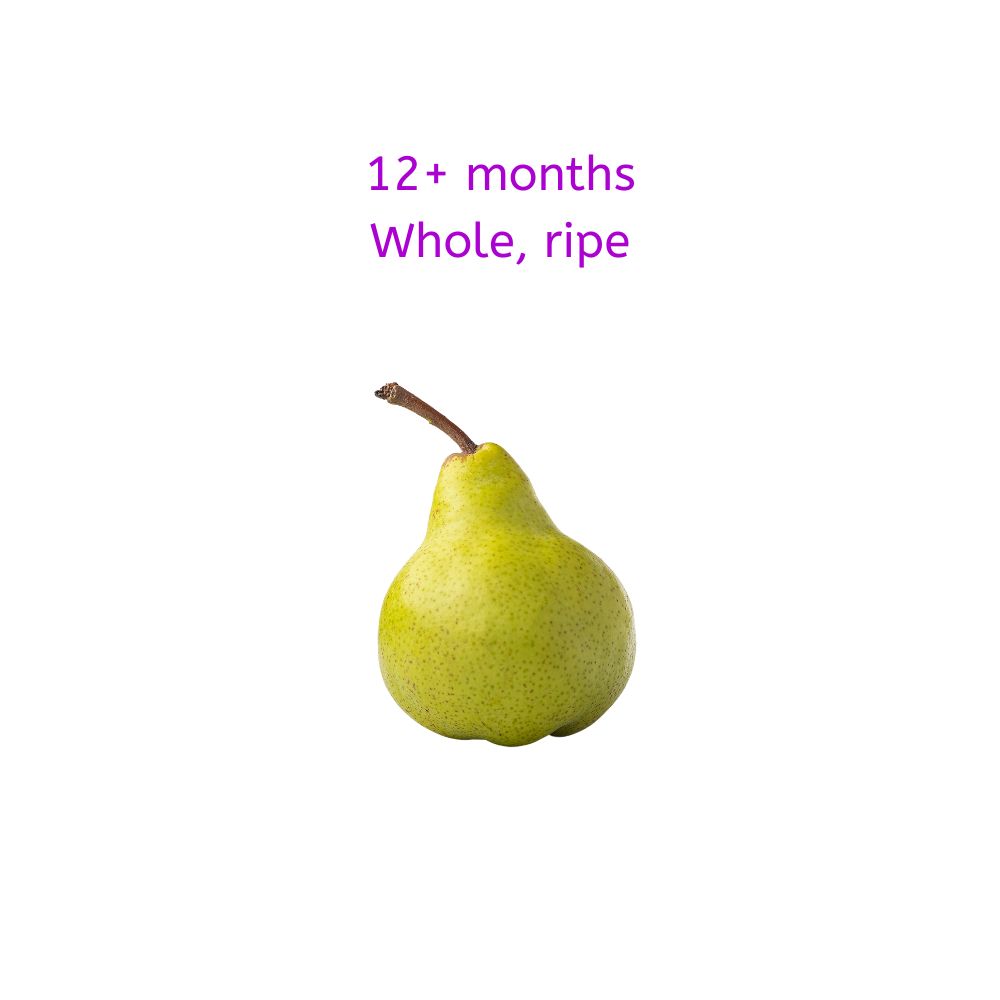
Are pears a common choking hazard for babies?
Yes, pears are considered a choking hazard for babies due to their firm and slippery texture.
To ensure your little one’s safety, it is recommended to steam or microwave pears until they are soft enough to bend or pierce easily.
Additionally, very ripe pears are a great option as they are soft.
Are pears a common allergen for babies?
No, allergies to pears are uncommon in babies.
However, babies with oral allergy syndrome, particularly those with sensitivities to birch tree pollen, may be sensitive to pears.
Individuals sensitive to other foods of the Rosaceae family, such as apricots, almonds, and plums, may also have a similar experience with pears.
As with any new food, you should introduce pears to your baby in small amounts to check for any adverse reactions.
If there is no reaction, gradually increase the amount over future meals.
Are pears gassy or hard to digest for babies?
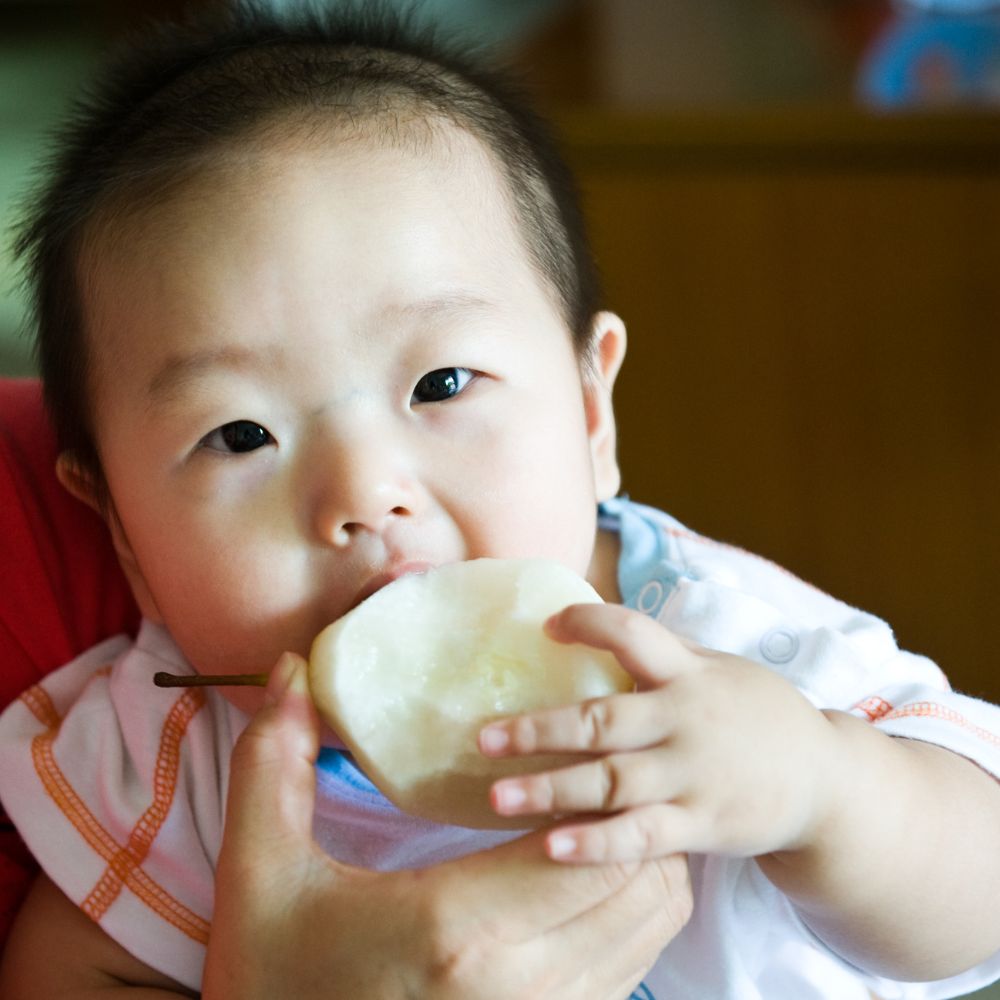
Pears are an excellent option for babies as they are fiber-rich and help promote healthy digestion and bowel movements.
While some high-fiber foods can produce gas and cause discomfort for babies, pears are generally well-tolerated and not considered a common cause of gas or digestive issues. However, as with any new food, it’s essential to introduce pears gradually and monitor your baby’s reactions to ensure they are well-tolerated.
If you have concerns about your baby’s digestion or notice any discomfort after introducing pears, consult your pediatrician.
Pear recipes for BLW
Cinnamon pear puree (6+ months)
- Peel and core a ripe pear and cut it into small pieces
- Steam the pear until it’s soft
- Add a pinch of cinnamon and blend it to a smooth puree
- Let it cool down and serve
Pear and avocado smash (8+ months)
- Peel and core a ripe pear and cut it into small pieces.
- Mash the pear with half an avocado until it’s smooth.
- Add a little bit of breast milk or formula to adjust the texture if necessary.
- Serve as is or spread it on a toast.
Pear and peanut butter bites (10+ months)
- Cut a pear into thin slices and spread a thin layer of peanut butter on each slice.
- Arrange the slices into a sandwich with the peanut butter in the middle.
- Steam or bake until the pear is soft and the peanut butter is melted.
- Let it cool down and serve as a fun finger food.
How to store pears
- To keep raw, whole pears fresh, select unripe ones and put them inside a paper bag with an apple or banana to hasten the ripening process. When ripe, store them in the refrigerator to extend their shelf life – they can remain in the fridge for up to 5 days.
- If peeling pears is necessary, do so immediately before eating to prevent them from discoloring. Peeled pears can be stored in an airtight container in the refrigerator for up to 2 days.
- If you have cut the fruit and have leftovers, put the cut portion face down on a plate and cover it securely with plastic wrap or foil. Cut pears can be held in the fridge for up to 2 days.
- Let cooked pears cool to room temperature before storing them in an airtight container in the refrigerator. Cooked pears can last up to 3 days in the fridge and be frozen for up to 3 months.
Are organic pears worth it?
Yes, organic pears can be worth it, especially if you’re concerned about exposure to pesticides.
Pears are part of the “dirty dozen,” which means they are among the most contaminated fruits and vegetables with pesticides.
Choosing organic pears can help reduce your baby’s exposure to harmful chemicals.
However, if you’re unable to find or afford organic pears, it’s still important to offer your baby this nutritious fruit.
You can reduce the pesticide residue on conventionally grown pears by thoroughly washing and peeling them.
Can babies drink pear juice?
Babies are generally recommended not to drink juice, including pear juice until they are at least one year old.
Even then, it is important to limit the amount of juice offered to avoid excessive sugar intake, which can lead to tooth decay and poor eating habits.
Instead, it is best to offer whole, mashed, or pureed pears to provide the most nutritional benefits for your baby.
Do you need to cook pears in BLW?
Although cooking pears is not required during baby-led weaning, it is advised for infants younger than 8 months to prepare them until they are soft and tender.
This lowers the possibility of choking and makes them simpler to absorb.
Babies that are older and more accustomed to eating can handle very ripe, tender raw pears.
To guarantee your baby’s safety, you should always closely monitor them when they are eating.
We’re Maria and Alberto, a married couple and educators who are nutrition enthusiasts. Even before we had kids, we were already crazy about nutrition.
We’d read scientific articles, watch videos from nutritionists, and spend hours listening to nutrition podcasts.
Today, we continue doing this, but in a different way, as we’ve learned to sift through the noise and trends. Nutrition, like any other field of knowledge, the more you read and learn, the more you develop a comprehensive understanding of reality, and that’s what has happened to us.
Before having our first child, we focused on learning everything we could about child nutrition, using the same techniques we had already employed, backed by our extensive knowledge in nutrition.
Our mission is to help other parents with their children’s nutrition, to help them become the best versions of themselves.
If we are what we eat and drink, which is absolutely true, let’s do it right!


